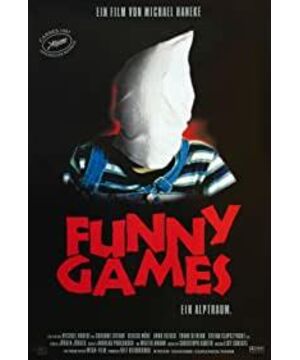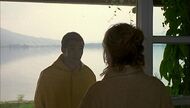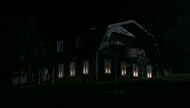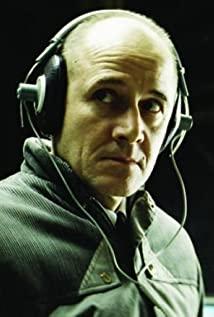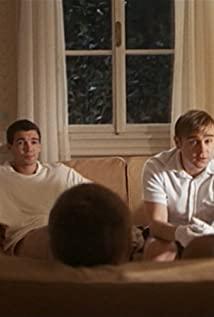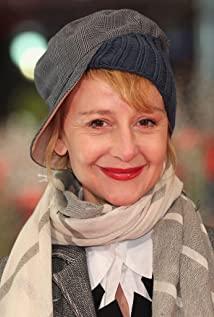For 1 hour, 6 minutes and 21 seconds, the background music sounded. Paul, who walked into the villa on the other side of the lake, turned his face and turned to the camera, as if looking at the audience. Change until the end of the movie at 1 hour, 7 minutes and 15 seconds. This is the last 54-second shot. When the shot was frozen, the murderer Paul created another kind of horror with a weird smile: Anna, George, and his son Georgie’s family were destroyed, but this tragedy is by no means an end. Paul came to the host's house with the same excuse for borrowing eggs. When they become uninvited guests again, this "fun game" of murder will happen at the same pace, and this bloody violent story will be repeated.
However, this does not seem to be a real horror. When Paul and Tom became the same people who made murders in a cycle, when they started to implement the next plan, the real violent perpetrator was Hanneck behind the camera: He did not let violence At the end, he did not use narrative methods to stop the tragedy. Instead, he gave the two murderers a more open and unrestrained space for violence. Paul was facing the camera and was violent to the audience, just like he and Tom would be tied up on a boat. Anna pushed down the water and ended the "fun game", Tom regarded the communication difficulties they discussed about the material world and the non-material world as a collusion between reality and illusion: "The illusion is also real. You can As seen in the movie, the movie is just a portrayal of real life..." A story of annihilation narrated in the movie is a certain manifestation of realistic violence, and the tragedy caused by violence is not only in the movie, but also in reality— —Paul and Tom created violence like reality, while in the illusory world of the movie, Haneke created a more desperate tragedy.
Indeed, this story dubbed a "fun game" is a bloody, cruel and even absurd violence. The dog named "Heggy" gradually calmed down after barking, which was the beginning of violence. Afterwards, George returned home from the dock and saw his wife Anna angry with two uninvited guests. It was a simple borrowing of eggs and shouldn't make people quarrel. George even asked Anna why he lost his temper, but Paul, who seemed shy, scolded him. Only then did George realize the reason for Anna’s anger. He slapped Paul. Although not serious, he completely angered Paul. , He hit George’s kneecap directly with a golf club, and even smashed the organ that played a key role. This was an important step in their violence, or it was because George, the only adult man in the family, lost his ability to move. , Making the contest between the two sides out of balance. Then the two people really played the "fun game". They bet that the Georges would die within 12 hours. This is a terrifying game, and they implemented it step by step according to this game: the escaped Joe Gee was caught by Paul. When he tried to escape again, Tom was shot to death with a shotgun. The TV and the wall were stained with blood from the splashes; Anna took off her clothes under their force, and was exhausted. After witnessing the death of Georgie, she watched her husband be beaten to death in the game, and at 8 o’clock the next day, in the game When it was over for a while, Paul, who didn't want to wait any longer, pushed Anna into the water, like a light push on an inanimate object, Anna disappeared under the water without even struggling.
Georgie and George died under the shotgun, Anna sank under the water, plus the dog, the family that had been on vacation was killed in a game, and they had no grievances with Paul and Tom, and they never even knew them. When a family of three became innocents, there is no doubt that Haneke created a violent story, and this tragedy continues. The reason why violence happened is that they modified the underlying rules of the "game". The game needs to be fair. Even if it is a risk, both parties need to formulate rules. This is the true meaning of the game and the key to its continuation. But Haneke is named "Fun game" obviously amplifies its "fun" and deliberately ignores the meaning of the rules of the game, and this kind of fun is completely for the film: when the game only becomes a game under the rules set by one party, it only Can move in an extreme direction that eliminates fairness. In the movie, there are actually many games. At first when the Georges drove to the lakeside villa, they put discs in the car to guess the singer’s name, which was a fun game; then they saw their neighbor Fred preparing. When the sail was launched, Anna told them that the race was going to be tomorrow. It seemed a bit unfair that they were preparing so early. Obviously, they had arranged to play a sailing game tomorrow. After that, Tom came to borrow an egg from Anna, "accidentally" for the first time. Let the eggs fall on the ground, and the eggs were scattered on the ground for the second time because of encountering "Heji". At that time, Anna explained that this was probably because Heji wanted to play a game.
There seems to be no violence in these three games, let alone death, but when George’s kneecap was broken and violence began to be implemented, all the games became the game of hope set by the killer himself: Paul picked up the golf ball and dropped it. In front of George, he told him that it was a "scrabble game". He asked why the ball was not hit. Tom said that because he hit something else, and this other thing was "Heggy", when Anna felt wrong When he went out to find Heki, Paul said "cold, colder" or "hot, hotter" behind him-saying "cold" or "colder" meant that Anna was looking in the wrong direction, saying "hot" or "hot" "Hoter" indicates that the direction is correct. Finally, in the word game, Anna finds Heki who was killed by them in the car; then Paul and Tom started playing the game of "kitten in pocket" and they put the sofa cushions Turned into a bag, and then put it on Georgie’s head, covering his head to see if Anna’s body is free of any excess fat, and this is exactly the bet between Paul and Tom. Anna is losing He was tortured under the condition of dignity; afterwards, Anna, who tried to escape, was caught back. Paul and Tom started playing "Affectionate Lovers" again. They counted by nodding their heads and determined that Anna’s age was 35 as the final number. , When this number was pointed to George, they asked Anna to choose a killing tool, using a knife or a shotgun, so that they could "legally" kill George...
Whether it’s a word game, or a "kitten in your pocket", or a "affected lover", the game is named by Paul and Tom, and the rules are of course set by them. These games constitute the "fun" of the tragedy of 12 hours Game", so in this story that has lost the rules of the game, the Georges are passive. Because of their passiveness, their death has become inevitable, and when death has become an unchangeable inevitable, the "fun game" itself has become Haneke. Looking for a visual and narrative exciting video game, but why does Hanek formulate such narrative rules? Why does Hanek create exciting fun in the "fun game"? If starting from the theme of the story, Haneke itself conveys a metaphor of a social game. The life of the Georges is undoubtedly rich. They own private cars, private villas, and private sailboats. They undoubtedly represent the middle class, while Paul and Tom In the character setting, he is a marginal character. In the course of the game, Paul repeatedly talked about Tom’s birth, said his parents were divorced, said he was a homosexual and an addict, and said he was a "because of a chaotic world." Troubled, spoiled and spoiled child overwhelmed by emptiness", Tom shed tears when he said this, and Paul also said that he was a drug addict, "We specialize in robbing rich people." This also seems to indicate that they are killing people. Motivation. And since they entered George’s house and began a violent plan by borrowing eggs, the reason seems to be that Anna and George were rude to them: Tom came in and said that he borrowed eggs for his neighbor Ava’s dinner. He spoke very quietly and was polite in the conversation. When the eggs were scattered on the ground, he also kept apologizing. He seemed to be a gentle and shy person. Then Anna was angry that George wanted to fuck them. It seemed that George had said impolite things, and even beat Paul. Slapped, so Paul hurt George with a golf club.
Two polite people were insulted by words and then slapped in the face, so they took revenge, and even if this kind of revenge was deliberate, it was because they were marginalized people who looked down on them opposite the wealthy class. In the movies, the floods, wars, and conflicts shown on TV programs seem to explain the inevitable contradictions of the entire society. However, if this fun game is regarded as a realistic reflection of social opposition, so as to "rationalize" the killing action, this becomes a misunderstanding. Of course Haneke has exposed the social reality, and of course has the rich and the poor. Criticism of opposition, of course, has an interpretation of the contradictions of the times, but this is just a "contradictory theory" that puts a kind of appearance on this fun game. No matter what class opposition is, it should not be an excuse for murder, and the Georges family Having such a life is not an evil, and the stigma on Paul and Tom looks more like a false identity constructed by a mob.
In fact, Hanneck uses this fun game to create tragic images, which is actually to make himself the perpetrator of violence, or that he wants to come out from behind the camera and present a world that has lost reason and logic, not just naked. He completed the definition of violence, and bloodyly turned the movie into a existence without justice and rules. He made the rules, just like Paul and Tom, canceling the participation rights of the Georges in the game, thus losing normal expectations. . From the perspective of the killing process, this was an unreasonable killing. It was a completely irrational violence. It was precisely because there was no reason and irrationality that Haneke cruelly placed the audience in a position of helplessness and helplessness. There is no God, no morality, and no law. Even Haneke himself is on the side of the violent. The excitement of the game is to destroy the expectations of the viewers.
Originally, two strangers broke into George’s house. George had three people on his side. They had the advantage in strength. When Hekie was killed and George’s kneecap was broken, this was the beginning of the loss of strength. At this time, The audience hoped for a fairly well-rounded contest, but Haneke did not pay attention to the needs of the audience during the advancement. Even if George is injured, it may be self-rescue by violence, or even double destruction of both sides. But all this has been denied. This kind of denial is to obliterate the audience's hope step by step, and it is to eliminate the audience's expectations time and time again. The first hope appeared when Georgie took the opportunity to run out. He waded across the water to the neighbor’s house and saw the dead neighbor—and this was the other one where Paul and Tom destroyed the door before entering the Georges’ family, but Georgie found out The shotgun on the ground. When the gun was held in his hand and pointed at Paul who found him, the audience’s expectation was that Georgie killed Paul with the gun and began to rescue the family, but no, Georgie would not use a gun at all. , The gun was taken by Paul and became a murder weapon to kill Georgie and George; when Paul went to chase George, there was only Tom in the room, and he only had a golf club. Anna and George might let The ending was reversed. This was the second hope the audience saw. And while Tom was going to the kitchen, Anna took the opportunity to ask George to untie her tape. Even if Tom found out, Anna even persuaded him: " You are still a child, and there is still a long way to go. Don’t make a big mistake.” Under the persuasion of words, Tom may also wake up and end this game, but the audience’s expectations are still lost. Tom did not listen to Anna’s. Advised, and at this time Georgie was also captured by Paul, and Paul had a more lethal gun in his hand; this time it was a more cruel massacre, and Georgie died here and found him. Under his double-barreled shotgun, when they killed Georgie, the two went out to breathe. At this time, Anna and George were left in the room. After resisting the pain of losing their son, they planned to escape, but George couldn’t walk at all. , So Anna fled from the window, which also made the audience see hope. Anna, who was hiding on the side of the road, was wary of missing a car at first, but when another car drove, she finally greeted her-hoping to appear again; and another George on one side found that the phone that fell into the water had a signal at first, so he started blowing on the phone with a hair dryer. The function of the phone was gradually restored, and even he dialed the phone and heard the other party's voice clearly-hoping to be more likely to be burned. rise……
A bigger death heralds a more tragic ending: the car Anna stopped for the second time was actually the car that Paul and Tom drove. She finally failed to escape from the clutches; George finally couldn't talk to outsiders, and the phone could only hear The other party’s voice cannot signal the other party for help. When they were caught back, a more cruel and fun game started, and in the process of the game called "Affectionate Lover", Anna saw a once-in-a-lifetime opportunity and held it firmly in her hand. She took advantage of Paul Inadvertently, he quickly picked up the shotgun on the ground when he was choosing the tool of crime, and then shot it at Tom. With a dull sound, Tom's body was penetrated and he died.-During the screening of this film at the Cannes Film Festival, it is said that When Anna shot Tom, the audience applauded, and the applause just showed that the audience expected a revenge for the innocent, but Haneke deconstructed all this ruthlessly: Paul took the gun, then looked for the remote control, and he pressed it. The remote control's rewind function was removed, so the scene that happened just now returned to the beginning: Anna wanted to quickly pick up the shotgun after being forced to pray, but Paul was faster than him, and the ending completely went to another ending: Anna. Without getting the gun, Paul handed the gun to Tom, and Tom shot George-when the ending was reversed, violence with violence finally did not happen, whether it was self-rescue or injury to both sides, it became the audience's wishful thinking. Like Paul said: "You shouldn't do this kind of thing, and you must never cancel it unilaterally, and you can't foul playing games."
It cannot be cancelled unilaterally or violated the established rules. Paul and Tom always firmly control the game, are always the creators of violence, and are always the implementers of blood, and Haneke undoubtedly helped them complete this fun game. Haneke truly became the master of the game by turning the audience into the object of "killing". Haneke's violence in visual narrative was to play a fun game of his own: when Paul introduced Tom as gay and addicted The gentleman said that he was also an addict, and then turned to the audience: "Are you satisfied with this story? He really comes from the lower class?" This is undoubtedly a question, a question of the audience's expectations; when Paul announced the start of the "Affectionate Lover" game George cried out in pain, "I'm fed up, what do you want to do?" Paul turned to the audience again: "This movie is not as long as a feature film should be. Is this enough? You don't want to see the story. Is there a complete and victorious ending?" This is undoubtedly a temptation to lure the audience into a more exciting story; when the story of Anna’s success in revenge is cancelled, it is Paul and Haneke who press the remote control. Because this knockout game cannot be changed in accordance with the audience’s requirements; and when Anna finally sank to the bottom, Paul and Tom discussed the issue of the emergence of heroes, which Haneke tried to explain: "The movie is a portrayal of real life. .Because what is illusory is also real."
In fact, the movie is a fun game. One side of the game is Haneke, who actively creates rules, and the other is the audience who passively enters the story. They are never in an equal position. Therefore, the audience’s rationality, hope and their Expectations are not able to influence Haneke, and Haneke deliberately cancels all normal logic, cancels the protection of moral laws, cancels the possibility of justice, and in such "obliteration" and murder, the audience changes from anger to fear. From fear to despair, just like the Georges, there is no chance to resist in the fate of being destroyed, and Haneke behind the camera shows a weird smile. He knows that even if the last 54 seconds of freeze frame, the audience will be inside. Amidst the tension and pain, under the double squeeze of fear and despair, I watched this movie completely, because the game must not be cancelled unilaterally, and the movie will not be unilaterally closed.
View more about Funny Games reviews


